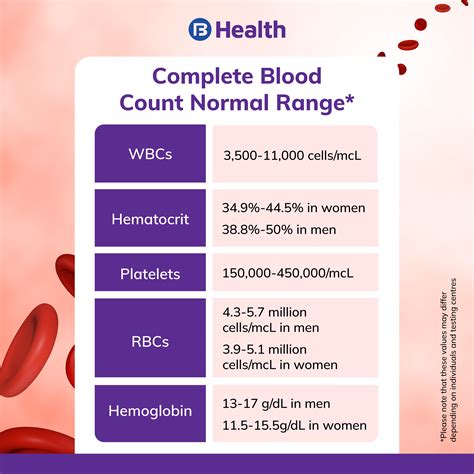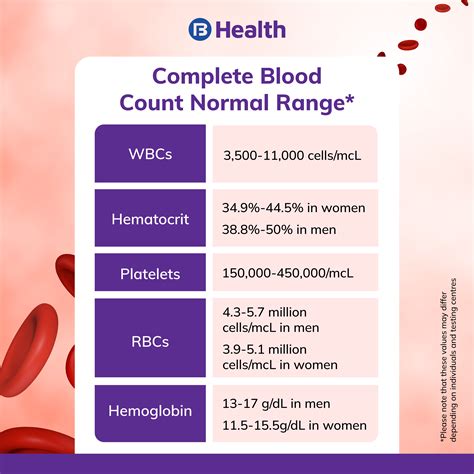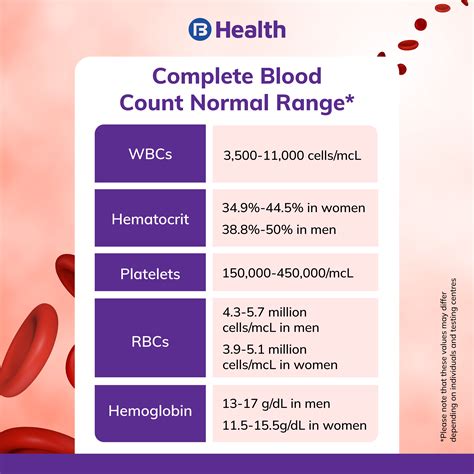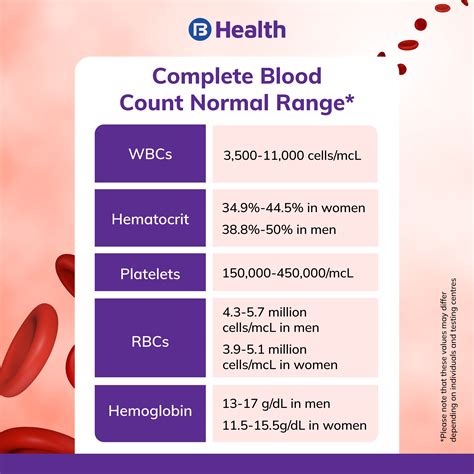Intro
Understand 5 CBC blood values: WBC, RBC, hematocrit, hemoglobin, and platelets. Learn normal ranges, high and low levels, and related health conditions like anemia and blood disorders, to interpret test results accurately.
The complete blood count (CBC) is a crucial diagnostic tool used in medicine to evaluate the overall health of an individual. It measures various components of the blood, including red blood cells, white blood cells, platelets, and hemoglobin. Understanding the different CBC blood values is essential for diagnosing and managing various medical conditions. In this article, we will delve into the world of CBC blood values, exploring their significance, normal ranges, and implications for health and disease.
A CBC test is typically performed to diagnose and monitor conditions such as anemia, infection, inflammation, and blood disorders. The test provides valuable information about the different cell types in the blood, allowing healthcare providers to identify potential issues and develop targeted treatment plans. With the advancements in medical technology, CBC tests have become more accurate and efficient, enabling healthcare providers to make informed decisions about patient care.
The importance of CBC blood values cannot be overstated. Abnormal results can indicate underlying health issues, such as nutritional deficiencies, autoimmune disorders, or blood cancers. On the other hand, normal results can provide reassurance and help healthcare providers rule out certain conditions. As we explore the different aspects of CBC blood values, it is essential to remember that these values are just one piece of the puzzle in diagnosing and managing medical conditions.
Introduction to CBC Blood Values

CBC blood values are typically reported in a standardized format, including various parameters such as red blood cell count, white blood cell count, platelet count, hemoglobin, and hematocrit. Each of these parameters provides valuable information about the blood and can help healthcare providers diagnose and manage various medical conditions. Understanding the normal ranges for these parameters is crucial for interpreting CBC results and making informed decisions about patient care.
Red Blood Cell Count
The red blood cell count (RBC) measures the number of red blood cells in the blood. Red blood cells are responsible for carrying oxygen from the lungs to the body's tissues. A low RBC count can indicate anemia, while a high count can suggest dehydration or polycythemia. Normal RBC counts vary depending on age, sex, and other factors, but generally range from 4.32 to 5.72 million cells per microliter (µL) for adult men and 3.90 to 5.03 million cells/µL for adult women.White Blood Cell Count
The white blood cell count (WBC) measures the number of white blood cells in the blood. White blood cells are an essential part of the immune system, helping to fight infections and diseases. A low WBC count can indicate a weakened immune system, while a high count can suggest infection, inflammation, or blood disorders. Normal WBC counts range from 3,500 to 10,500 cells/µL for adults.Understanding CBC Blood Value Ranges

CBC blood value ranges are essential for interpreting test results and diagnosing medical conditions. The following are some common CBC parameters and their normal ranges:
- Red blood cell count: 4.32-5.72 million cells/µL (adult men), 3.90-5.03 million cells/µL (adult women)
- White blood cell count: 3,500-10,500 cells/µL
- Platelet count: 150,000-450,000 platelets/µL
- Hemoglobin: 13.5-17.5 grams per deciliter (g/dL) (adult men), 12-16 g/dL (adult women)
- Hematocrit: 40.7-50.3% (adult men), 36.1-48.3% (adult women)
Platelet Count
The platelet count measures the number of platelets in the blood. Platelets are small cells that play a crucial role in blood clotting. A low platelet count can indicate bleeding disorders or bone marrow problems, while a high count can suggest infection, inflammation, or blood cancers. Normal platelet counts range from 150,000 to 450,000 platelets/µL.Interpreting CBC Blood Value Results

Interpreting CBC blood value results requires a comprehensive understanding of the different parameters and their normal ranges. Healthcare providers consider various factors, including the patient's medical history, symptoms, and physical examination, when interpreting CBC results. Abnormal results can indicate underlying health issues, such as anemia, infection, or blood disorders.
Hemoglobin and Hematocrit
Hemoglobin and hematocrit are two essential parameters in CBC tests. Hemoglobin measures the amount of hemoglobin in the blood, while hematocrit measures the proportion of red blood cells in the blood. Low hemoglobin and hematocrit levels can indicate anemia, while high levels can suggest dehydration or polycythemia. Normal hemoglobin levels range from 13.5 to 17.5 g/dL for adult men and 12 to 16 g/dL for adult women, while normal hematocrit levels range from 40.7 to 50.3% for adult men and 36.1 to 48.3% for adult women.CBC Blood Values in Disease Diagnosis

CBC blood values play a crucial role in disease diagnosis and management. Abnormal results can indicate underlying health issues, such as:
- Anemia: low red blood cell count, low hemoglobin, and low hematocrit
- Infection: high white blood cell count, low platelet count
- Blood disorders: abnormal red blood cell, white blood cell, or platelet counts
- Blood cancers: abnormal white blood cell count, low platelet count
CBC Blood Values in Monitoring Treatment
CBC blood values are also essential in monitoring treatment efficacy and adjusting therapy as needed. For example: * In patients with anemia, CBC tests can help monitor the response to iron supplements or blood transfusions. * In patients with blood cancers, CBC tests can help monitor the response to chemotherapy or other treatments.Limitations and Potential Biases of CBC Blood Values

While CBC blood values are a valuable diagnostic tool, they have limitations and potential biases. For example:
- CBC tests may not detect certain medical conditions, such as early stages of anemia or blood cancers.
- Results can be influenced by various factors, such as age, sex, and medical conditions.
- Abnormal results may require additional testing to confirm a diagnosis.
Future Directions in CBC Blood Value Analysis
The field of CBC blood value analysis is continuously evolving, with advances in technology and medical research. Future directions may include: * Development of more sensitive and specific CBC tests * Integration of CBC results with other diagnostic tools, such as genetic testing or imaging studies * Use of artificial intelligence and machine learning to improve CBC result interpretation and disease diagnosisConclusion and Recommendations

In conclusion, CBC blood values are a vital component of medical diagnosis and treatment. Understanding the different parameters and their normal ranges is essential for interpreting CBC results and making informed decisions about patient care. While CBC tests have limitations and potential biases, they remain a valuable tool in disease diagnosis and management. As the field of CBC blood value analysis continues to evolve, it is essential to stay up-to-date with the latest advances and recommendations.
We encourage readers to share their thoughts and experiences with CBC blood values in the comments section below. If you have any questions or concerns about CBC tests or results, please do not hesitate to reach out to your healthcare provider. By working together, we can improve our understanding of CBC blood values and provide better care for patients.
What is a CBC test?
+A CBC test, also known as a complete blood count, is a diagnostic tool used to evaluate the overall health of an individual. It measures various components of the blood, including red blood cells, white blood cells, platelets, and hemoglobin.
What are the normal ranges for CBC blood values?
+Normal ranges for CBC blood values vary depending on age, sex, and other factors. Generally, normal ranges include: * Red blood cell count: 4.32-5.72 million cells/µL (adult men), 3.90-5.03 million cells/µL (adult women) * White blood cell count: 3,500-10,500 cells/µL * Platelet count: 150,000-450,000 platelets/µL * Hemoglobin: 13.5-17.5 grams per deciliter (g/dL) (adult men), 12-16 g/dL (adult women) * Hematocrit: 40.7-50.3% (adult men), 36.1-48.3% (adult women)
What do abnormal CBC results indicate?
+Abnormal CBC results can indicate underlying health issues, such as anemia, infection, blood disorders, or blood cancers. It is essential to consult with a healthcare provider to interpret CBC results and determine the underlying cause of abnormal results.
